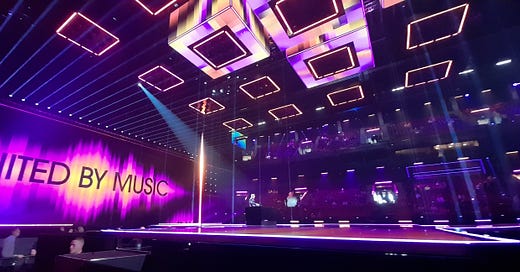What the hell happened at Eurovision?
Despite the drama and chaos on Saturday, the song contest might have looked normal to viewers. But behind the scenes, the biggest crisis in Eurovision's history was unfolding.
This year’s Eurovision Song Contest, beset by the controversy over Israel’s participation while it bombards Gaza, was always going to be one of the most political in history. There were widespread calls for a boycott, and protests all around host city Malmo. Israel’s participation required the highest level of security for any song contest in history. But even in this context, the shocking events of this week have managed to put the contest in such disrepute that Eurovision may never recover. Two contestants described the experience of being in this year’s contest as “traumatic”. My friends who were there in Malmo said it’s the worst atmosphere they’ve ever felt. One called Saturday, “one of the darkest days of my life”. Even the winner, Nemo from Switzerland, criticized the EBU during his final press conference.
The seeds were sewn in February, when Israeli broadcaster KAN announced that it would be participating in Eurovision even though they are at war. Despite significant pressure, the European Broadcasting Union (the association of public broadcasters in Europe, the Middle East and North Africa which has been staging the yearly song contest since 1956) said it would not exclude Israel from this year’s contest. However the EBU ruled that Israel’s first song submission, “October Rain”, violated the contest’s ban on political lyrics because it referenced the October 7 Hamas invasion and terrorist attack. At first, Israeli broadcaster KAN refused to change the lyrics and indicated they would rather sit out the contest, a stance supported by the country’s culture minister. But Israeli President Isaac Herzog intervened, saying: “Those who hate us seek to push aside and boycott the state of Israel from every stage, Israel must sound its voice with pride and its head high and raise its flag in every world forum, especially this year,” according to KAN. The broadcaster then agreed to negotiations, after which an altered version of the song with the new title “Hurricane” was agreed. In hindsight, it’s worth asking: was KAN’s instinct to sit out this year because of the war, as Israel had done in the past, the right one?
As the contest drew closer, the fury over Israel’s participation grew stronger. The EBU was accused of hypocrisy for kicking Russia out in 2022 for its invasion of Ukraine, but not doing the same in response to Israel’s actions in Gaza. But as I discussed on the EU Scream podcast last month, the difference was that while several EBU members said they would quit Eurovision if Russia was not banned in 2022, no broadcaster did so when it came to Israel in 2024 - not even Ireland, Iceland or Spain. The EBU insisted that Eurovision is a contest between broadcasters not between governments, and that the Russia situation is different because almost all Eurovision participating countries sanctioned Russia while no member government has sanctioned Israel.




